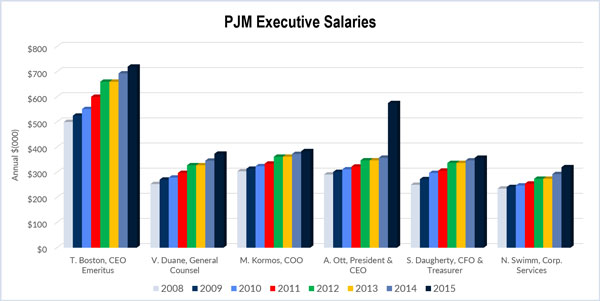By Rory D. Sweeney
A consumer advocacy group filed a complaint with FERC on Monday saying PJM’s recent rate-increase request is “unprecedented” and failed to consider mitigating costs by limiting employees’ pay increases (ER17-249).
Public Citizen’s Energy Program, based in D.C., filed the complaint in response to a member fee increase that PJM stakeholders approved in October. (See “Members Committee Endorses Revised Fee Hike,” PJM Markets and Reliability and Members Committees Briefs.)
It asks FERC to deny the rate filing “until PJM offers options on controlling certain expenses.”
The complaint argues that the largest factor necessitating the increase is accommodating PJM’s projected 4.8% average annual growth rate in the financial compensation paid to PJM employees over the next eight years.
“PJM already commands premium salaries paid to its employees, particularly to its top executives,” the complaint contends. “For many of Public Citizen’s members, it remains a tough economy. There aren’t many industries or companies within PJM’s service territory that are projecting a 4.8% annual growth rate for employee financial compensation over the next eight years.”
“The impact on consumers of PJM’s proposed administrative rate revisions is 7 cents a month, phased in over eight years,” PJM spokesperson Paula DuPont said in an emailed statement. “Consumer advocates representing the PJM region support our proposal and were involved throughout its development. The proposal was unanimously approved by members.”
Public Citizen argues that neither PJM nor its stakeholders — which include state consumer advocates — “ever formally considered dampening growth in employee compensation as a measure to mitigate the rate hike.”
West Virginia Consumer Advocate Jacqueline Lake Roberts defended PJM’s request in a response to the complaint, also filed Monday. Consumer advocates are “active participants” in PJM’s stakeholder process and aren’t treated differently than other members, Roberts wrote in the response.
“As the steward of consumer interests, [Roberts ] takes rates and proposed increases very seriously,” the response reads. “[Roberts] believes that the stated rate as filed will ensure that consumers continue to benefit from these services. For these reasons, [Roberts] submits that the allegations of Public Citizen are erroneous.”
A representative of the Pennsylvania Office of Consumer Advocate was on PJM’s Finance Committee, Roberts noted, and the committee considered several proposals before unanimously endorsing the one filed with FERC — however, all of them assumed cost increases that necessitated rate increases.
While Public Citizen’s complaint said PJM employees “deserve praise and respect for administrating duties on behalf of FERC under the Federal Power Act,” it also noted that PJM’s audited financial reports indicate employee financial compensation grew from more than $98 million in 2011 to more than $124 million in 2015, for an average annual growth rate of 6.1%. Over this five-year period, employee compensation grew from 35.6% of total PJM expenses in 2011 to 37.4% in 2015.
PJM’s request doesn’t detail other “concerning” expenses, the complaint says, such as payments to outside political lobbying organizations and “expensive social events available to select PJM members.”
Public Citizen says it has tried to become a voting PJM stakeholder, but it can’t afford the RTO’s $2,500 annual membership fee.
“It’s certainly easier to balance budgets if you can tap into a pile of someone else’s money to close the gap,” Tyson Slocum, Public Citizen’s Energy Program director, said in an emailed statement.
“The right thing to do would be for PJM to shrink its out-of-control growth in executive pay,” he said. “FERC should not allow PJM to pay for excessive executive compensation through an unprecedented hike in electric rates paid by household consumers. PJM must learn fiscal discipline and recognize that its salary structure is bloated.”




